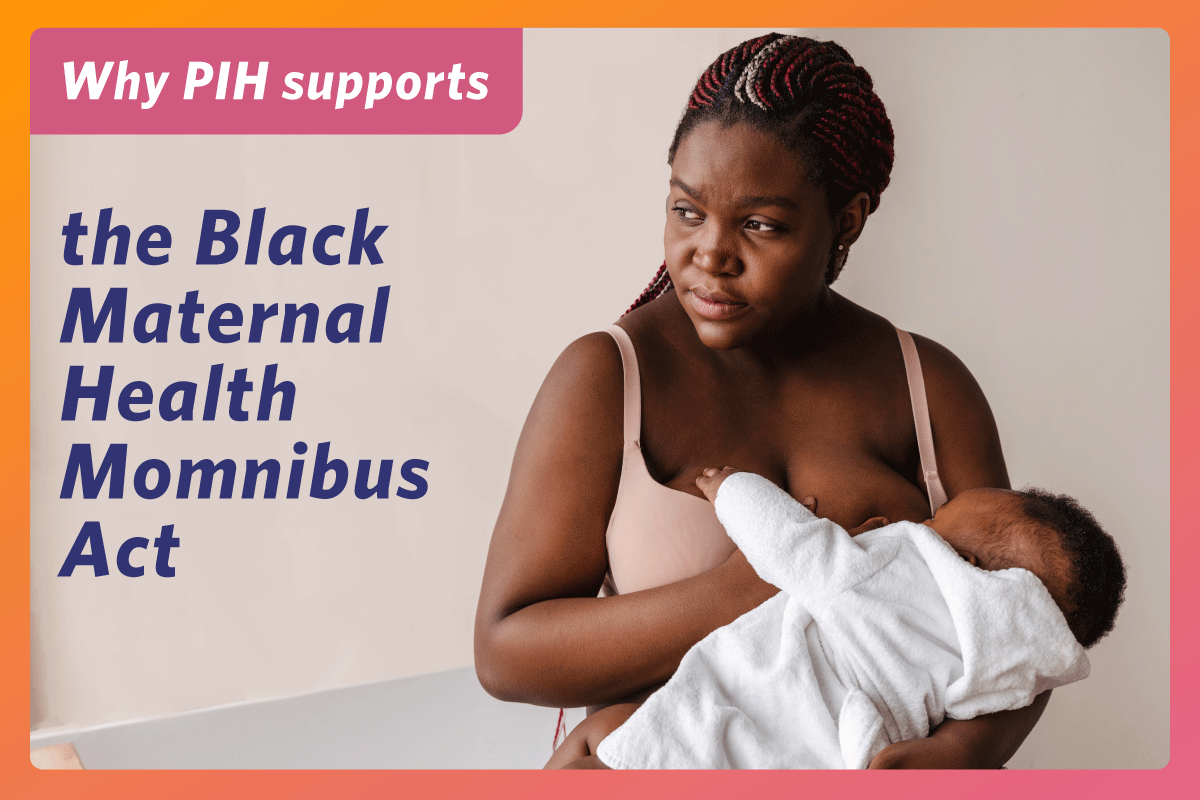PIH Endorses Legislation to Address the U.S. Maternal Health Crisis
PIH-supported Black Maternal Health Momnibus Act calls for historic investments to end racial and ethnic disparities in maternal health outcomes
Posted on Jun 5, 2023

The United States has the highest maternal mortality rate of any high-income country, and this crisis is only worsening. Maternal deaths have increased by 40 percent over the last few years, Black women are three times more likely to die from a pregnancy-related cause than white women, and maternal mortality rates are nearly two times higher in rural areas than urban areas.
More than 80 percent of these deaths are preventable. The structural racism and social and economic inequities that lead to poor maternal health outcomes in this country are preventable, too.
Last month, the Black Maternal Health Momnibus Act, an ambitious legislative package that aims to solve the U.S. maternal health crisis, was re-introduced to Congress. More than 200 organizations, including Partners In Health, have endorsed this bill which calls for historic investments critical to addressing racial inequities in health outcomes, advancing maternal health equity, and building robust, community-led health systems.
Below, we outline the provisions of the package and how you can take action.
What is the Black Maternal Health Momnibus Act?
The Black Maternal Health Momnibus Act is a comprehensive legislative package to solve the U.S. maternal health crisis and end racial and ethnic disparities in maternal health outcomes. Called the “Momnibus” for short, this package includes 13 evidence-based bills to address different drivers of the maternal health crisis, including bias in the health care system, investments in social determinants of health, and growing and diversifying the health workforce.
The Momnibus package was introduced by the Black Maternal Health Caucus, a group of Congressional members working to establish Black maternal health as a national priority. Overall, the Momnibus includes more than $1 billion to help address systemic inequities that lead to worse health outcomes, particularly for communities that have high rates of maternal mortality and large maternal health disparities between racial and ethnic groups.
What does the Black Maternal Health Momnibus Act include?
“Omnibus” is a term for a legislative package consisting of multiple smaller bills. The historic Black Maternal Health Momnibus Act includes thirteen individual bills that will:
Make critical investments in social determinants of health that influence maternal health outcomes, like housing, transportation, and nutrition.
Extend the Special Supplemental Nutrition Program for Women, Infants, and Children (WIC) eligibility in the postpartum and breastfeeding periods.
Provide funding to community-based organizations that are working to improve maternal health outcomes and promote equity.
Increase funding for programs to improve maternal health care for veterans.
Grow and diversify the perinatal workforce to ensure that every mom in America receives maternal health care and support from people they trust.
Improve data collection processes and quality measures to better understand the causes of the maternal health crisis in the U.S. and inform solutions to address it.
Support moms with maternal mental health conditions and substance use disorders.
Improve maternal health care and support for incarcerated moms.
Invest in digital tools to improve maternal health outcomes in underserved areas.
Promote innovative payment models to incentivize high-quality maternity care and non-clinical support during and after pregnancy.
Invest in federal programs to address maternal and infant health risks during public health emergencies.
Invest in community-based initiatives to reduce levels of and exposure to climate change-related risks for moms and babies.
Promote maternal vaccinations to protect the health of moms and babies.
How will the funding be disbursed?
The funds are allocated across different programs to meet specific needs in maternal health. For instance, $100 million would go to community-based organizations, tribal organizations, Native Hawaiian organizations, or nonprofits that work with multiple community-based partners. The money can be used to hire and train staff, develop culturally and linguistically appropriate resource centers or materials specific to communities, create demonstration projects that address social determinants of health, and host community-led consultations. These funds will also give communities the ability to develop tailored plans and build out culturally competent trainings. Funding will also be used to increase and diversify the nursing workforce in maternal and perinatal care, grow the doula workforce, and increase the maternal mental health and substance use disorder workforce. In addition, money will be allocated for grants that would allow educational institutions to train midwives, physician assistants, and others in maternal health.
What progress has been made thus far?
An earlier iteration of the Momnibus was first introduced in Congress in 2020. In 2021, Congress passed the Protecting Moms Who Served Act, making this bill the first piece of the Momnibus package to be signed into law.
The reintroduction of the Momnibus is unlikely to garner enough support to pass in its entirety due to the current political climate, but Congressional champions are working to advance components of the package one bill at a time. This means that PIH can both advocate for the ambitious and visionary package as a whole, and pragmatically push for individual bills within the package at the same time.
What can people do to support this?
All moms deserve care and dignity in their health care, regardless of race or circumstances. Congress must work together to pass the entire Momnibus.
Use this action tool to contact your members of Congress and tell them to support investments in maternal health.

